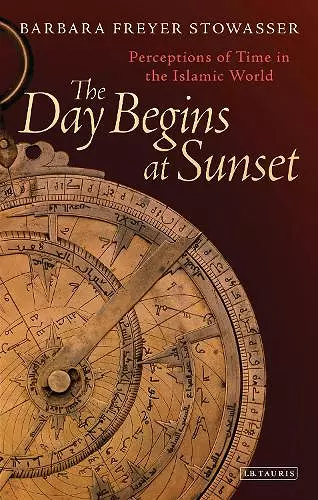The Day Begins at Sunset
Perceptions of Time in the Islamic World
Barbara Freyer Stowasser author
Format:Hardback
Publisher:Bloomsbury Publishing PLC
Published:9th May '14
Currently unavailable, and unfortunately no date known when it will be back

First in-depth treatment of calendars, time and time-measurement in the world of Islam from one of one of the world's foremost contemporary scholars of Muslim history and religion.
The fullest account ever written of the fascinating nexus between Islam and Time, this is a major contribution to the wider history of ideas and religion. Night and day, and the twelve lunar months of the year, are'appointed times for the believing people'. Reading the sky for the prayers of the hour has thus for Muslims been a constant reminder of God's providence and power. In her absorbing and illuminating new book, the late Barbara Freyer Stowasser examines the various ways in which Islam has structured, ordered and measured Time. Drawing on examples from Judaism and Christianity, as well as the ancient world, the author shows that while systems of time facilitate the orderly function of vastly different civilizations, in Islam they have always been fundamental. Among other topics, she discusses the Muslim lunar calendar; the rise of the science of astronomy; the remarkable career of al-Biruni, greatest authority in Muslim perceptions of Time; and the impact of technologies like the astrolabe, Indian numerals and paper. The fullest account ever written of the fascinating nexus between Islam and Time, this is a major contribution to the wider history of ideas and religion.
'Well presented, well informed and well researched, the book is readable and interesting, and I will recommend it to my students. The Day Begins at Sunset engagingly treats a subject for which there is little accessible published material.' Robert Hoyland, Professor of Islamic History, University of Oxford 'In her enjoyable new book, Barbara Freyer Stowasser demonstrates with great clarity the centrality of time within Islamic culture - whether the time of prayers, of feast-days, of sacred months or of centennial years - and shows how understandings of chronology integrated the practices of Islam into a cosmos measured by subtle astronomical calculations and observations. The regularities of time provided a unifying structure for the whole of the Islamic realm, while the lunar year, slowly revolving through the seasons, served to distinguish Islam from its neighbours. As the author authoritatively and readably shows, a fascination with time appears in the work and thinking of Islam's mathematicians, historians and encyclopaedists, and is therefore a topic of central interest to the student of Muslim science, history and literature.' Charles Burnett, Professor of the History of Islamic Influences in Europe, The Warburg Institute, University of London 'Throughout human history people have devised ways of measuring the passage of time. The Day Begins at Sunset focuses upon solutions adopted in the Islamic world, but a reader will be introduced to the earlier Sumerian-Babylonian, Roman, Jewish, and Christian calendrical systems as well. The author has placed at the centre of her book the remarkable writings of al-Biruni, an early 11th-century polymath, the uncontested medieval authority on time and timekeeping, and a thoughtful and influential voice on the relationship between science and religion. By structuring her volume in this way, the late Professor Stowasser was able to transform a complex topic into an engaging and highly readable book - one that provides an excellent, reliable introduction to Islamic science in general as well as early Islamic perceptions of time. The Day Begins at Sunset is highly recommended as a starting point for anyone wanting a non-technical guide to pre-modern Islamic science and its relationship to religion.' Emilie Savage-Smith, FBA, Professor of the History of Islamic Science, University of Oxford 'The Day Begins at Sunset is a unique work of scholarly synthesis and lively narration that offers a wealth of historical, social, and religious information about timekeeping and time perceptions in the Islamic world, past and present. It also has much to say about the long coexistence in Islamic societies of serious scientific inquiry and theological interpretation before the impingement on the Islamic world of Western imperial and colonial power and its attendant cultural assumptions. The late Barbara Freyer Stowasser's astute use of the great Muslim polymath, al-Biruni, as the principal lens through which the reader can follow her wide-ranging explorations adds a still further dimension to this learned, engaging excursion into science, religion, and history. The book is an admirable final chapter to a perceptive scholar's corpus of work.' William A Graham, Murray A Albertson Professor of Middle Eastern Studies & University Distinguished Service Professor, Harvard University 'Sadly, this is Barbara Freyer Stowasser's last insightful study on Muslim civilisation. Here, the subject matter is Time. The Muslim vision of time is God-centred and based on the Qur'an. Time moves in the sun's rhythm measuring night and day, while from the moon's phases months and years are calculated: all signs of divine power and providence. While measurement required scientific knowledge, scriptural exegesis necessitated religious knowledge. Stowasser's central point is that many Muslim theologians and scientists viewed both sources as mutually independent forms of intellectual enterprise, thereby preserving the truth and validity of each in proclaiming the divine secrets of God's creation. The crucial chapters of her study are devoted to a stimulating examination of the works of Abu al-Rayhan al-Biruni (d. ca. 1050), mathematician and ethnographer extraordinaire, and his description of the calendars of the ancients including those of the Greeks, Persians, Christians and Jews.' David Waines, Professor Emeritus of Islamic Studies, Lancaster University
ISBN: 9781780765426
Dimensions: unknown
Weight: 396g
200 pages